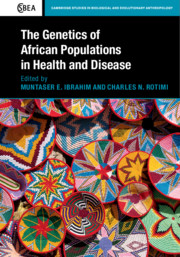Book contents
- The Genetics of African Populations in Health and Disease
- Cambridge Studies in Biological and Evolutionary Anthropology
- The Genetics of African Populations in Health and Disease
- Copyright page
- Contents
- Contributors
- 1 Reflections on Conceptualizing Africa for Biological Studies with a Historical Component
- 2 History and Genetics in Africa
- 3 Disease, Selection, and Evolution in the African Landscape
- 4 Genetic Susceptibility to Visceral Leishmaniasis
- 5 Genetics of Infection in Sub-Saharan Africa
- 6 Pharmacogenomics and Infectious Diseases in Africa
- 7 A Glimpse into Pharmacogenomics in Africa
- 8 Genomics of Cardiometabolic Disorders in Sub-Saharan Africa
- 9 Breast Cancer in African Populations
- 10 Sociobiological Transition and Cancer
- 11 The Genetic Epidemiology of Orphan Diseases in North Africa
- 12 Birth Defects and Genetic Disease in Sub-Saharan Africa
- 13 Neurogenetic Disorders in Africa: Hereditary Spastic Paraplegia
- 14 Enabling Genomic Revolution in Africa
- Index
- References
6 - Pharmacogenomics and Infectious Diseases in Africa
An Evolutionary Perspective
Published online by Cambridge University Press: 02 December 2019
- The Genetics of African Populations in Health and Disease
- Cambridge Studies in Biological and Evolutionary Anthropology
- The Genetics of African Populations in Health and Disease
- Copyright page
- Contents
- Contributors
- 1 Reflections on Conceptualizing Africa for Biological Studies with a Historical Component
- 2 History and Genetics in Africa
- 3 Disease, Selection, and Evolution in the African Landscape
- 4 Genetic Susceptibility to Visceral Leishmaniasis
- 5 Genetics of Infection in Sub-Saharan Africa
- 6 Pharmacogenomics and Infectious Diseases in Africa
- 7 A Glimpse into Pharmacogenomics in Africa
- 8 Genomics of Cardiometabolic Disorders in Sub-Saharan Africa
- 9 Breast Cancer in African Populations
- 10 Sociobiological Transition and Cancer
- 11 The Genetic Epidemiology of Orphan Diseases in North Africa
- 12 Birth Defects and Genetic Disease in Sub-Saharan Africa
- 13 Neurogenetic Disorders in Africa: Hereditary Spastic Paraplegia
- 14 Enabling Genomic Revolution in Africa
- Index
- References
Summary
Modern humans evolved in Africa approximately 200,000 years ago (Campbell and Tishkoff 2010). As groups migrated out of Africa they underwent bottlenecks leading to sharp reductions in population size and genetic diversity (Amos and Hoffman 2010; Harpending and Rogers 2000; Ramachandran et al. 2005). To this day, African populations retain the most genetic diversity globally (Auton et al. 2015). In order to survive both within and out of Africa, early human populations had to adapt to their novel environments, including new food resources, colder climates, higher altitudes, and, especially, infectious diseases (Balaresque et al. 2007; Fumagalli et al. 2011). These adaptive requirements, facilitated by natural selection, led to an increased frequency of alleles that were beneficial in that environment. Due to the fact that these adaptive requirements were driven by local environmental pressures, some of these evolutionarily advantageous alleles display geographic and ancestral specificity, as observed in the genomes of present-day humans (Fumagalli et al. 2011).
- Type
- Chapter
- Information
- The Genetics of African Populations in Health and Disease , pp. 95 - 127Publisher: Cambridge University PressPrint publication year: 2019

